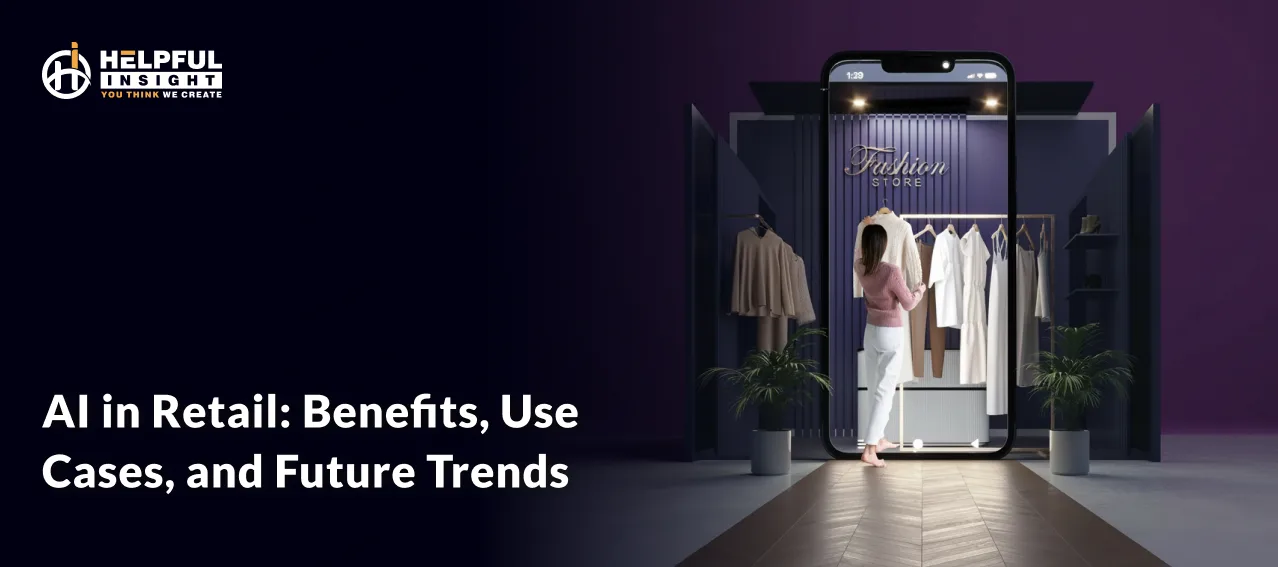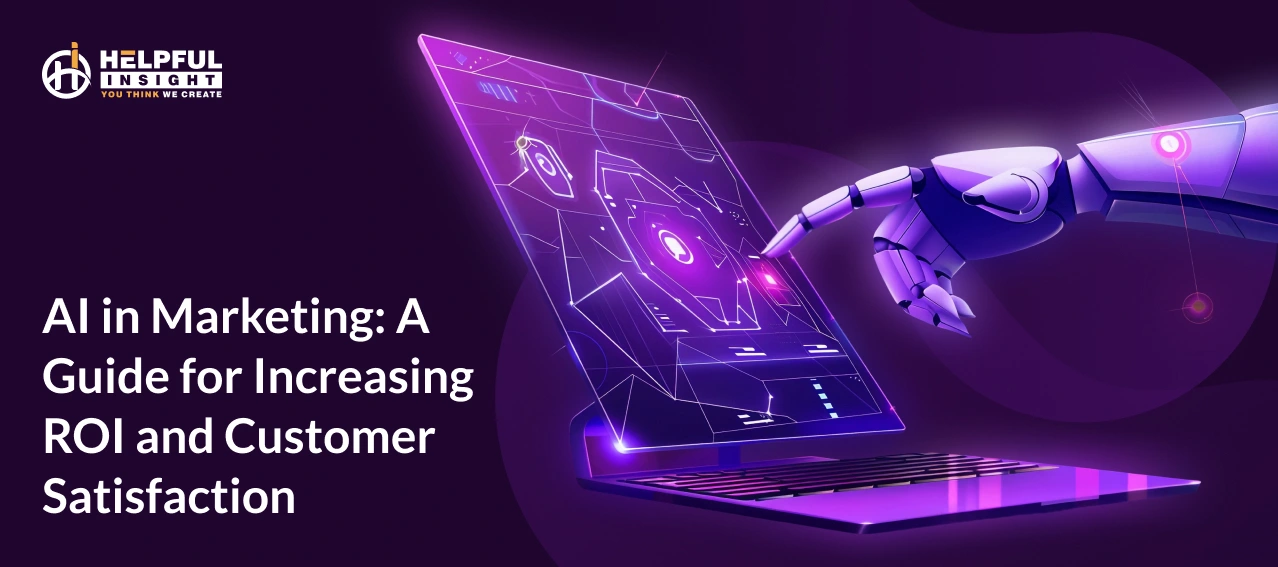Technology has made our lives easier in so many ways, right? In the past, who would have thought that even when you’re far away from home, you could control the devices at your home like turning lights on or off, adjusting the AC temperature, making your home smart just by using an app on your mobile phone.
All of this has become possible, thanks to IoT app development. In the future, the demand for IoT mobile application and smart devices is only going to increase as people continue seeking digital solutions that make their lives simpler. The rapid adoption of 5G technology and AI will further accelerate this growth.
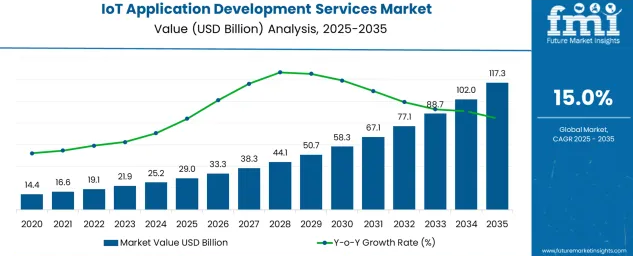
In fact, the global IoT app market is expected to reach $117.3 billion by the year 2035 from $29 billion in 2025. That’s a huge jump. This clearly presents a golden opportunity for businesses to create innovative IoT apps with the help of a reputable IoT app development company. Yes, there are already plenty of IoT apps in the market, but there’s still ample space for visionary and value-driven digital solutions. After all, almost every industry is looking to leverage IoT app development benefits.
Wondering how to create an IoT app, its benefits and cost? That’s exactly what we are going to discuss today. So, keep reading.
What is IoT Mobile Application?
Do you use a smartwatch, fitness band, or smart lights at home? That’s a perfect example of IoT. In simple terms, an IoT mobile app is an application on your phone that lets you control and manage smart devices easily. These apps connect to your devices using Wi-Fi, Bluetooth, or mobile networks. With just a few taps, you can turn on lights, adjust your AC, check your fitness data, or monitor home security, all from anywhere.
IoT apps make life smarter and easier by connecting devices, sharing data, and helping them work together. They collect data, process it, and give you useful insights to the end user. This is also the reason that mobile IoT apps solutions are utilities almost everywhere, right from households to a wide range of industries.
IoT App Development Benefits For Businesses
If you have any doubt in your decision of building an IoT application, then this section will clear all your doubts, as we are going to discuss the key benefits of investing in IoT app development services for your business.
1. Improved Operational Efficiency
Every enterprise wants their operations to work in a smooth manner, right? But sometimes unexpected issues arise that disturb the entire workflow. Here IoT app development solutions can help. They allow businesses to track how well things are working in real-time. With IoT, you can automate jobs, check equipment health, and make smarter choices based on data. For example, sensors can track machine use, so businesses can fix problems before they happen.
2. Enhanced Customer Experience
One of the main reasons behind the success of any small and large business is that they fulfill the needs of their customers and deliver satisfactory services. IoT apps greatly assist in improving customer experience with a business by giving them quicker and better service. They can use data from customers to offer personalized help, like suggesting products or services based on what they like. Businesses can also fix issues before customers notice them, all thanks to smart IoT devices.

3. Access To Data-Driven Insights
With IoT apps, businesses can easily extract valuable information from data, which helps them make sound decisions, beneficial for their business. They can spot trends, find new business opportunities, and predict future trends also. Real-time data lets businesses know what’s happening right now, so they can make quick decisions that improve services and grow faster. For example, businesses can learn what customers want before they ask for it by analyzing data from IoT sensors.
4. Cost Savings
Investing in IoT application development services can save businesses money in so many amazing ways. They can optimize valuable resource usage, fix things before they result in huge expense, can track their equipment, energy use, and stock more efficiently. This means fewer repairs, lower energy bills, and less waste, helping businesses spend less and improve their bottom line. For example, smart IoT solutions can adjust lighting and temperature to save energy.
Must-Have Features Of IoT Mobile App Solutions
Features are the main attraction of any mobile application, and the same goes for IoT based apps. Businesses should ensure that they integrate the best and most advanced set of features in their app with the help of a reliable IoT application development services company in USA.
| Features | Description |
| Easy Device Integration | This feature allows users to quickly integrate smart devices with their app. It finds and connects them easily, making the entire setup effortless. |
| User-Friendly UI/UX | IoT app developers should make sure that the app is easy to use. Buttons and screens must be simple to navigate, so anyone can control smart devices without getting confused. |
| Real-Time Data Analytics | IoT mobile applications should show live data from your devices. You can see patterns, spot problems early, and make smart choices based on real-time data. |
| Remote Access & Monitoring | This functionality helps users in controlling and checking their smart devices from anywhere using their phone. No need to be physically present at the device location. |
| Smart Automation | Enables devices to do things automatically, without needing any human. For example, lights turn on when you walk in. You set the rules once, and they follow them. |
| Strong Connectivity Management | Make sure the IoT app keeps devices connected at all times. If something disconnects or slows down, the app should fix it immediately so everything keeps working smoothly. |
| Voice Assistant Integration | Voice integration feature in an IoT app allow app users to use their voice to tell smart devices what to do. It works with Alexa, Siri, or Google to make things even easier. |
| Multi-User Support | The mobile IoT apps should enable many users to use the application. Everyone gets their own account, and they can choose who controls what devices. |
| Real-Time Alerts & Notifications | The app should send instant alerts to the user’s smartphone if something important happens, like if a door opens or a device needs your attention. |
IoT Application Development Tech Stack To Know
Selecting the wrong tech stack for IoT app development can have many bad consequences, like poor performance, security issues, increased development cost and time the risk of project failure. In order to develop secure and reliable mobile IoT app solutions, it’s paramount to choose the best tools and technologies. Let’s have a look at the main technologies, programming languages, and frameworks expert IoT application developers use to build IoT applications.
| Key Elements | Tools & Technologies |
| Programming Languages | C, C++, Rust, Java, Python. Node.js |
| Development Boards | Arduino, Raspberry Pi, ESP8266 / ESP32 |
| Databases | MySQL, PostgreSQL, MongoDB, Cassandra |
| Frameworks | Node-RED, Eclipse IoT,TensorFlow, Spring Boot |
| Cloud Platforms | AWS IoT Core, Google Cloud IoT, Microsoft Azure IoT Hub |
| Communication Protocols | MQTT, CoAP, HTTP/HTTPS, LoRaWAN |
| Data Analytics Tools | TensorFlow, Apache Spark, Apache Flink |
How To Build An IoT App From Scratch?
Thinking of IoT app development brings to mind a very tough and complex task. Well, it is not when you partner with the experienced IoT app developers just like we have at Helpful Insight. For Internet of Things application development, IoT app developers follow a sequence of steps. Want to know these steps are, then keep reading this blog.
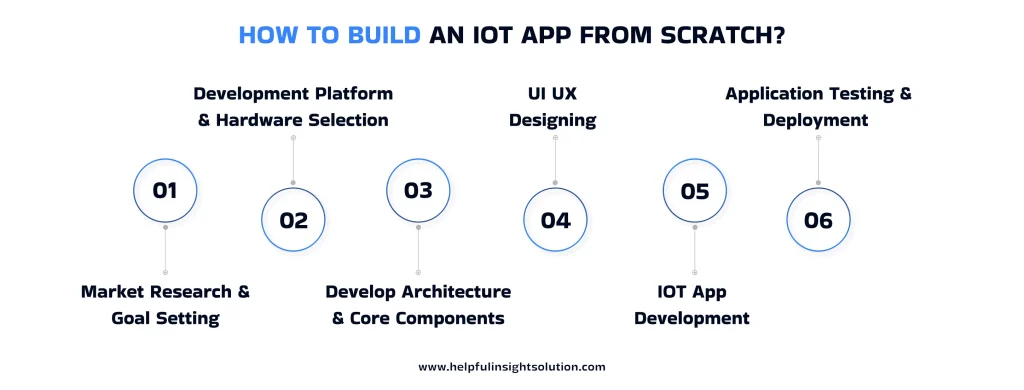
1. Market Research & Goal Setting
First and foremost, begin with doing extensive market research about IoT based apps, why people are liking these types of app, and how your business will benefit from it. Think about the problem your app will solve.
Moreover, also set clear goals that what you want to achieve with IoT app development services, like saving time or automating tasks. Study other IoT apps also to see what works or what does not. This will help you build an innovative app that really helps you and your customer.
2. Development Platform & Hardware Selection
To build your IoT app, you need to pick the right app development platform and hardware, like sensors and actuators. Choose a cloud platform like Google Cloud, AWS, or Azure to store and manage your data. Select single board computers like Raspberry Pi or ESP32, sensors and gateways that match what your app needs to do.
Make sure everything works well together and can grow if more users or devices are added later. This step is important to make sure your IoT applications work smoothly and meet both future as well as present needs of businesses.
Read Also: A Comprehensive Guide to IoT App Development: Best Practices and Trends
3. Develop Architecture & Core Components
In this phase, IoT application developers will create the architecture of your IoT, which is basically the blueprint showcasing how the different components of your IoT app will interact with each other. Plan how data moves from the sensors to the app and how users will see it.
Make sure the system is easy to update, fix, or grow. Also, check if the mobile IoT app solutions can work with other smart devices. A well-structured architecture helps your app stay secure and fast even when more people use it.
4. UI UX Designing
Make sure you do not compromise on the quality of UI/UX design services. The IoT mobile app design should be clean, simple, and not confusing. Use clear icons, buttons, and short labels. Make sure users can easily turn devices on or off, check data, or get alerts.
Show important information in a way that’s easy to understand, like using graphs or colors. Test the design with a few people to see what works best. If users can’t figure out how to use the app, they won’t use it at all. So, it’s best to keep it simple and helpful.
5. IOT App Development
This is the stage where your idea starts becoming a real, working app. IoT app developers in USA utilize the platform architecture made earlier to write the code. Start with the most important parts, like collecting data from sensors, showing it in the app, and allowing users to control devices.
Additionally, mobile app developers will create both the frontend and backend of the IoT mobile application using programming languages like C++, Java, and Python. Agile is considered the best and most cost-effective methodology for IoT app development.
6. Application Testing & Deployment
With the main coding part of Internet of Things app development getting completed, you can relax that your app is almost complete. Yes, almost, as you cannot launch the app without testing the app. IoT mobile app testers will thoroughly test the application from inside and out.
They will look for bugs, glitches, and other issues that can hamper the performance of the app. If they find any issue, they will immediately fix it, and then IoT app developers can move forward with the app deployment.
How Much Does IoT App Development Cost?
So, now you know the process to make an IoT app, but you might be wondering how much it costs to develop IoT application, right? Understanding the price of IoT app development will help you create your dream mobile app within your budget. It’s vital to understand that the IoT app development cost depends on a number of factors like:
- App complexity
- Features of the app
- Mobile app development platform selected
- Device integrations
- Choice of tech stack & hardware
- Location of IoT application developers
- UI/UX designing
- Testing & quality assurance, and many more.
On average, its cost can start from around $20,000. You can also use our cost calculator to get an idea of an estimated cost according to your project requirements. To help you get better clarity, let’s have a look at the below table to evaluate the IoT application development cost for different complexity levels.
| App Type | Estimated Cost |
| Simple App | $20,000 to $40,000 |
| Mid-Level Complexity App | $40,000 to $100,000 |
| Advanced App | $100,000 to $200,000 |
IoT Mobile App Use Cases In Different Industries
IoT and artificial intelligence have marked their presence in almost every industry and are leaving a huge impact. The benefits of Internet of Things application development across industry are immense, such as improved operational efficiency, better customer experience, data-driven decision making and cost savings.
In this section, let’s have a look at the applications of mobile IoT apps in different industries.
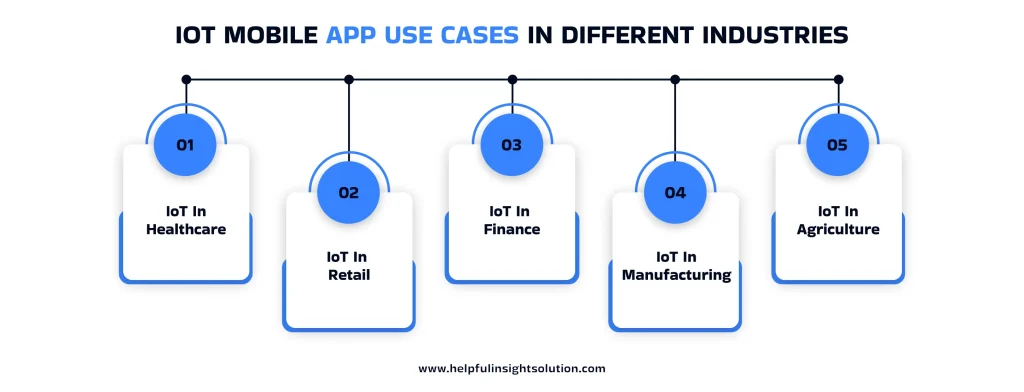
1. IoT in Healthcare
Heart Rate Monitoring: Wearable devices track heart rates and alert doctors if there’s an emergency. This helps in timely medical responses to prevent serious issues.
Diabetes Monitoring: Sensors under a patient’s skin send glucose readings to their phone, helping them manage their levels and predict when they may drop dangerously low.
Cancer Treatment Tracking: Activity trackers monitor a cancer patient’s movement and fatigue. This data helps doctors adjust treatment plans for better results and recovery.
2. IoT in Retail
Predictive Maintenance: IoT sensors on store equipment like refrigerators help predict when they need repairs, saving energy and ensuring food stays fresh.
Smart Inventory Management: IoT app development helps retailers monitor product stock levels, ensuring they never run out or overstock.
Reducing Supply Chain Waste: IoT applications provide real-time insights into how products move through the supply chain, greatly helping in reducing waste.
3. IoT in Finance
Contactless Payments: IoT mobile app development services allow payments through devices like phones and smartwatches, making shopping fast and easy.
Fraud Detection: AI-powered mobile IoT apps help detect fraud by watching for unusual activities, patterns and transactions.
Personalized Banking: IoT app development helps banks improve customer service by using collected data to offer personalized services to their customers.
4. IoT in Manufacturing
Remote Monitoring: IoT apps let businesses track the performance of machines and equipment from anywhere, improving production efficiency.
Predictive Maintenance: IoT sensors can predict when equipment will fail, allowing repairs before problems happen.
Fleet Management: Internet of Things app development services can help in tracking shipping vehicles to optimize delivery times and prevent delays.
5. IoT in Agriculture
Monitoring Crop Health: IoT sensors assist farmers in tracking plant health and help them grow more with fewer resources.
Livestock Monitoring: IoT applications help farmers monitor the health of their livestock using sensors, identifying sick animals early.
Weather Data Collections: Smart IoT sensors collect and give real-time weather data, helping agriculturists in taking better decisions on watering and pest control.
Challenges Faced In Building IoT Applications
When you decide to build IoT application, be prepared that certain challenges might arise, some big and some small. But don’t worry, there is no problem in the world that can’t be solved, and the same goes for the IoT application development.
In this section, we will equip you with the key challenges IoT app developers generally face and their solutions.
1. Choosing The Right IoT Device and OS
Before starting IoT app development, it’s important to think about the devices and operating system you’ll use. IoT devices are not as powerful as computers, and they have small memory. This means IoT app developers need to pick an operating system that works well with the device’s abilities and the app’s needs. So, it’s best to pick an OS that fits both the device’s power and the app’s purpose.
2. Security and Privacy Concerns
One of the biggest challenges that IoT application developers struggle with is to ensure the security and privacy of the user data. Why? IoT devices can be vulnerable because they don’t have a lot of computing power, making it hard to protect them from hackers. Each connected device can be a security risk. That’s why it is important to use strong encryption like AES, protect data with multi-factor authentication, and move the heavy security work to the cloud for better protection.
3. Device Compatibility and Integration
It’s tough to make sure that all IoT devices, like sensors, controllers and operating systems, work well together, as they use different systems and protocols. If not integrated properly, things may not work smoothly, which will ultimately affect the IoT app performance. To solve this problem, an Internet Of Things app development agency should use lightweight communication systems like MQTT or CoAP and an edge gateway to connect different devices and systems seamlessly.
4. Scalability Challenges
As more and more devices connect to the internet, it becomes really difficult to manage all the data. If the IoT mobile application isn’t built to grow in the future as the demand grows, it can cause crashes or slowdowns. That’s why it is important to build IoT apps using cloud-based solutions that can scale as needed. Use microservices to allow parts of the mobile application to grow independently, and pick a cloud service that supports this.

Partner With Helpful Insight To Build Premium-Quality IoT Mobile App
IoT app development services have made a huge buzz among businesses, and for all the right reasons. Businesses across industries are eager to develop an IoT-powered mobile app that can help them make their business smart and capable of standing out in the market. Creating an IoT app platform requires the expertise of an IoT application development agency. Are you also looking for a firm with the capability of developing IoT and AI solutions? Well, your search ends here with Helpful Insight.
We are the industry-leading Internet of Things app development company in USA that possesses a decade of experience in creating high-quality, secure, and feature-packed IoT apps. Our team comprises expert IoT app developers who are the best in the industry and known for developing AI and IoT applications of different sizes and scales.
At Helpful Insight, we have excellence in developing multiple types of IoT based apps like consumer IoT, industrial IoT, and commercial IoT. Our IoT application developers have a knack for building out-of-the box mobile IoT apps that make your business different from your competitors and bring immense success and growth.
FAQs
We completely understand that you want your IoT app to be developed quickly. But it’s a little bit tricky to tell the development timeframe without having any knowledge about your IoT app needs and requirements. Moreover, the IoT mobile app development timeline depends on a number of factors, such as app type, complexity level, features added, UI/UX design, third-party integrations and many more. Once our IoT mobile app development company understands your requirements, we will equip you with a complete development blueprint and timeline details.
There are certain important components of an IoT platform that are vital to know in order to create IoT app and understand its working. They are sensors, actuators, cloud connectivity, data processing, app user interface, and gateway.
Some of the most popular real-life examples of IoT app development solutions are Amazon’s Alexa for smart homes, Waymo’s self-driving taxis, Google Maps for navigation and real-time traffic update & the Fitbit app for tracking fitness and nutrition.
There are so many industries that are using IoT in mobile app development, such as manufacturing, retail, healthcare, transportation, agriculture, energy & utilities, real estate and many more.





